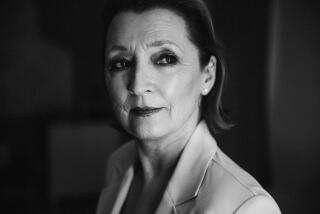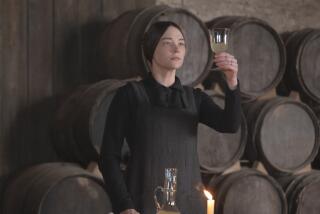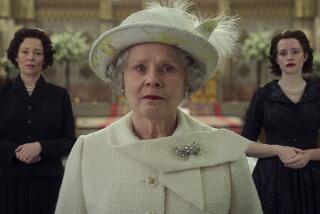‘Farewell, My Queen’ follows Marie Antoinette and her loves
- Share via
French filmmaker Benoît Jacquot’s”Farewell, My Queen,”based on the novel by Chantal Thomas, finds a new angle on an infamous monarch.
Set almost entirely within the walls of the great Palace of Versailles, the film, which opened in Los Angeles on Friday, focuses specifically on four days in July 1789 as the French Revolution picks up momentum. The drama captures the crumbling of the aristocracy set against the intrigues of Marie Antoinette’s relationships with two women: Duchess Gabrielle de Polignac and the queen’s personal reader, the young servant girl Sidonie Laborde.
“Marie Antoinette is a superstar,” said Léa Seydoux, who plays Laborde. “In France she may even be the first superstar, and people are always fascinated by her.”
The narrative traces a silent romantic triangle in which passions are withheld, affections concealed and romance denied: The queen (Diane Kruger) has a stormy friendship with De Polignac (Virginie Ledoyen), while Marie Antoinette’s personal reader, Laborde, harbors a royal crush of her own.
“What I really liked about this book is the combination of a very simple point of view, a point of view from a very modest place, combined with such an enormous event,” Jacquot, 65, explained last spring while in Los Angeles. “It’s all very streamlined in terms of the narrative; the film takes place mostly within Versailles, except for a couple of scenes, and even within Versailles in just a few locations.”
Jacquot is something of a central-casting ideal of a French filmmaker, with a slightly louche air and a style that is difficult to pin down apart from his reputation as a skillful director of actresses. One of his best-known films remains 1995’s “A Single Girl,” a breakout role for the then-teenage Ledoyen.
Jacquot was introduced to Thomas’ novel in 2002 when, while promoting his film “Adolphe,” he appeared as part of a round table discussion alongside the author. He found himself taken with the story, and when producer Jean-Pierre Guerin approached him to adapt it some years later, he leaped at the opportunity.
He was particularly keen to shoot in the actual Palace at Versailles. He took advantage of some of the location’s grandest views, but he also made a point to stage scenes in cramped stairwells and service hallways to convey the pecking order of living conditions within the aristocracy. (Parts of the movie were filmed at other chateaus to replicate Versailles.)
“What really interested me about Versailles was exploring confined space,” Jacquot said. “It’s one location, but it’s a very paradoxical place, composed of many different kinds of spaces. It’s practically like Versailles was a country within the country.”
Jacquot said the film’s focus on Marie Antoinette’s relationships with women is supported in many ways by historical record.
“It is well known that Marie Antoinette had favorites, like Gabrielle,” the filmmaker said. “Now they could have been mistresses or they could have been very close friends.... There is much testimony, letters and the like, from princesses and the aristocracy of the time, where the language, the way they talk to one another, could absolutely make you think this is a passionate, sensual, loving relationship.”
“It is about being fascinated by someone, whether that’s a man or a woman doesn’t really matter,” Kruger said. “I didn’t think, ‘Oh, I have to lust for Gabrielle.’ I think that is something that may read on-screen, and maybe Benoît intended, but he certainly didn’t tell me to think about wanting to sleep with her.”
Seen largely through the eyes of Seydoux’s character, the Marie Antoinette who emerges in the film is of a deeply conflicted woman, playfully oblivious and petulant at one moment, insightful and mature the next.
That duality runs throughout “Farewell, My Queen,” a box office success when it was released in France last spring. The film can be seen either as the telling of the fall of Versailles or as using that historic event simply as the backdrop for a more personal-scaled romantic tale.
“We actually see the human side of this person,” Kruger said. “Even though she knows this is going to be the end of her era and she is probably going to die, the one thing she thinks about is her one love. I feel like it makes it so much more intimate.”
More to Read
Only good movies
Get the Indie Focus newsletter, Mark Olsen's weekly guide to the world of cinema.
You may occasionally receive promotional content from the Los Angeles Times.











